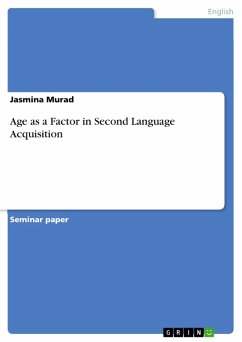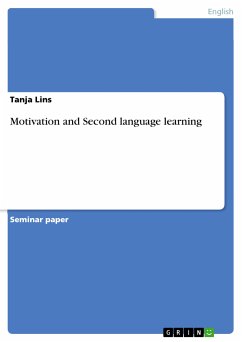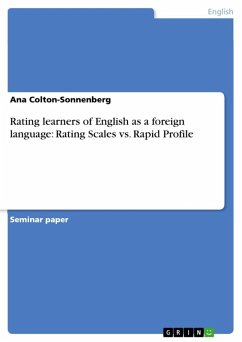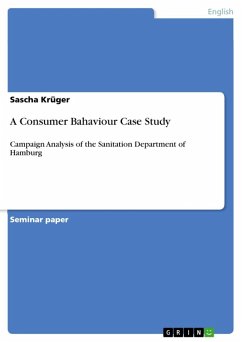
Motivation as a Factor in Second Language Acquisition (eBook, ePUB)
Sofort per Download lieferbar
Statt: 17,95 €**
15,99 €
inkl. MwSt. und vom Verlag festgesetzt.
**Preis der gedruckten Ausgabe (Broschiertes Buch)
Alle Infos zum eBook verschenkenWeitere Ausgaben:

PAYBACK Punkte
0 °P sammeln!
Seminar paper from the year 2012 in the subject English Language and Literature Studies - Linguistics, grade: 2,3, http://www.uni-jena.de/ (Anglistik/Amerikanistik), course: Second Language Learning, language: English, abstract: "The limits of my language are the limits of my world." This quotation by Ludwig Wittgenstein, a famous philosopher of the 19th century, shows how important second language learning is in our modern society. Language is one of the main components of the society and culture of the people who speak it. People speaking different languages are important for the community i...
Seminar paper from the year 2012 in the subject English Language and Literature Studies - Linguistics, grade: 2,3, http://www.uni-jena.de/ (Anglistik/Amerikanistik), course: Second Language Learning, language: English, abstract: "The limits of my language are the limits of my world." This quotation by Ludwig Wittgenstein, a famous philosopher of the 19th century, shows how important second language learning is in our modern society. Language is one of the main components of the society and culture of the people who speak it. People speaking different languages are important for the community in which they work and live, because they can connect different cultural groups. Besides this social factor, there is an economic need for multilingual people as well. Apart from the requirement of translators and interpreters, there are an increasing number of jobs where people are required to interact with people from foreign countries. The ability of communicating in two or more language can be an essential reason for getting your dream job. Another advantage of speaking different languages is that it makes travelling much easier and gives you the opportunity of maintaining friendships with people from all over the world. Nowadays most children start learning a second and even a third language when they are still very young. Mostly they are not aware of the benefits of speaking different languages for their later lives. They simply learn it because it is in the curriculum of their school, which is designed for the needs of society rather than for the learner's interests. This does not seem like a good point of departure for a successful learning process. So it is the teacher's major challenge to motivate the students to put effort in learning the foreign language. But how does motivation influence second language learning? This paper will define motivation and introduce different motivation theories. Then it will discuss the influences of motivation on second language learning and answer the question what teachers can do to motivate their students.
Dieser Download kann aus rechtlichen Gründen nur mit Rechnungsadresse in A, B, BG, CY, CZ, D, DK, EW, E, FIN, F, GR, HR, H, IRL, I, LT, L, LR, M, NL, PL, P, R, S, SLO, SK ausgeliefert werden.













